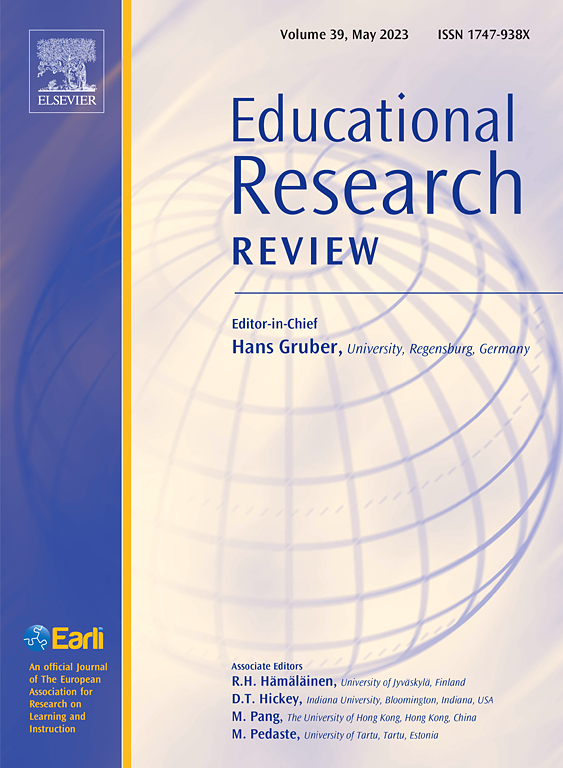Exploration of domains of educational purpose in K-12 data literacy education research
IF 10.6
1区 教育学
Q1 EDUCATION & EDUCATIONAL RESEARCH
引用次数: 0
Abstract
Digital data have an increasingly prominent role in various life sectors, ushering in an importance for data literacy education (DLE) in schools. To better understand the versatile educational purposes in this multifaceted topic for students' well-rounded development, this paper presents an in-depth scrutiny into “what DLE is for” in K-12 education. We utilized Gert Biesta's (2009) holistic account of “good education”, which brings together three interconnected domains—becoming equipped with skills (qualification), becoming a part of social orders (socialization), and becoming the subject of one's own life (subjectification)—to examine prior DLE research and explore how such domains of educational purpose have been portrayed in different ways. Our analysis shows that while there is some need for clarifying meanings of the expressed purposes of DLE, there are recognizable educational goals focused on cultivating data savvy students for present and future societal roles, most notably data-centric professions and coping in everyday data environments. Aims of gaining personal value from data and empowering students for critical engagement with data(fication) were also present to complement DLE in terms of its more subjectification-oriented viewpoints. Overall, intriguing meanings, synergies, and cross-pressures can be identified, calling for the recognition of the pluralistic approaches and cultivation of balance in them to holistically educate students to exist in and with the data-rich world. Further investigations and fundamental discussions about educational emphases in DLE research as well as informed engagement in them in local educational decision-making are encouraged.
K-12数据素养教育研究中教育目的域的探索
数字数据在生活的各个领域中发挥着越来越突出的作用,学校的数据素养教育显得尤为重要。为了更好地理解学生全面发展这一多方面主题的多种教育目的,本文对K-12教育中的“DLE是什么”进行了深入的审查。我们利用Gert Biesta(2009)对“良好教育”的整体描述,将三个相互关联的领域——成为技能的装备(资格),成为社会秩序的一部分(社会化),成为自己生活的主体(主体化)——结合在一起,检查先前的DLE研究,并探索这些教育目的领域是如何以不同的方式被描绘出来的。我们的分析表明,虽然有必要澄清DLE所表达的目的的含义,但有一些可识别的教育目标侧重于培养精通数据的学生,以适应当前和未来的社会角色,尤其是以数据为中心的职业和应对日常数据环境。从数据中获得个人价值和赋予学生批判性地参与数据(化)的目标也被提出,以补充DLE更主体化的观点。总的来说,可以确定有趣的意义,协同作用和交叉压力,要求承认多元方法并培养其中的平衡,以全面教育学生在数据丰富的世界中生存并与之共存。鼓励进一步调查和基本讨论DLE研究的教育重点,以及在当地教育决策中知情参与。
本文章由计算机程序翻译,如有差异,请以英文原文为准。
求助全文
约1分钟内获得全文
求助全文
来源期刊

Educational Research Review
EDUCATION & EDUCATIONAL RESEARCH-
CiteScore
19.40
自引率
0.90%
发文量
53
审稿时长
57 days
期刊介绍:
Educational Research Review is an international journal catering to researchers and diverse agencies keen on reviewing studies and theoretical papers in education at any level. The journal welcomes high-quality articles that address educational research problems through a review approach, encompassing thematic or methodological reviews and meta-analyses. With an inclusive scope, the journal does not limit itself to any specific age range and invites articles across various settings where learning and education take place, such as schools, corporate training, and both formal and informal educational environments.
 求助内容:
求助内容: 应助结果提醒方式:
应助结果提醒方式:


